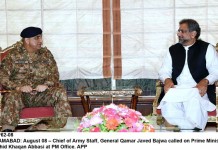مضمون کا ماخذ : Raging Rhino
Rebel TTP Ahrar commanders launch splinter group
ISLAMABAD: In what appears to be a serious blow to the banned Tehrik-i-Taliban Pakistan Jamaatul Ahrar (TTP JuA), a group of senior commanders have launched a splinter group over serious policy differences with the leadership, dissident commanders said on Saturday. Mukarram Khan, a senior Ahrar leader, was named chief of the new group “Hizb-ul-Ahrar”, several […]
ISLAMABAD: In what appears to be a serious blow to the banned Tehrik-i-Taliban Pakistan Jamaatul Ahrar (TTP JuA), a group of senior commanders have launched a splinter group over serious policy differences with the leadership, dissident commanders said on Saturday.
Mukarram Khan, a senior Ahrar leader, was named chief of the new group “Hizb-ul-Ahrar”, several senior commanders said in a video released on Saturday. Dr Aziz Yousafzai was appointed as the group’s spokesman.
Mukarram, who belongs to Mohmand Agency, was the main character behind the JuA’s activities with his position as head of the group’s intelligence unit, according to a militant leader, who has worked with him in the group. He was member of the group’s central ‘shura’ or council until last month.
Daily Times has also received the video in which a group of Ahrar commanders are sitting in an undisclosed place. Some commanders delivered brief speeches in the video and threw weight behind Mukarram.
Mukarram did not appear in the video, as he has been receiving treatment of injuries he had received in what he said “an attack by his JuA militants”.
A militant source confided to Daily Times that the meeting was held in Afghanistan’s eastern Kunar province, bordering Pakistan. There was no independent verification of the venue of the meeting.
Pakistani security officials believe that TTP JuA has hideouts in Nangarhar’s Lalpura area.
Mukarram, who was one of the close confidants of the JuA chief Omar Khalid Khorasani, recently parted ways with the group after some of Khorasani’s supporters allegedly shot and injured him, as cracks surfaced in the ranks of the group. He appeared in a video last month and told his supporters that a “plot to kill him has failed”.
In an audio message to the dissident commanders, Mukarram accused Khorasani-led group of involvement in the killing of innocent people.
He mentioned several major attacks, including the deadliest on the people in Wagah, the border town with India, in 2014, which killed nearly 60 people and injured more than 100 others.
He also referred to the suicide attack on Christians in a public park in Lahore in March 2016, which claimed the lives of 73 people and had injured more than 350. He said Christians had not been in war with them, and the attack on the innocent non-Muslims “cannot be justified”.
Mukarram also mentioned the bombing of an office of the National Database and Registration Authority (NADRA) in Mardan, Khyber Pakhtunkhwa, in December 2015, which killed at least 26 people and left 50 others injured.
The Hizb-ul-Ahrar chief said that the JuA was involved in extortion of money and fighting with other militant groups.
“I and other members tried to convince the leadership to change such policies, but failed,” the rebel commander said.
Some militant sources said that nearly 40 percent of the Ahrar commanders currently support the new faction, and more could join them in view of reservations over the policies of Khalid Khorasani.
TTP JuA spokesman Asad Mansoor did not offer comment when a query was emailed to seek his reaction.
TTP militants from Mohmand Agency had launched the JuA in August 2014 after differences with the leadership. A majority of the TTP and JuA militants have been operating from the Afghan side of the border after they crossed the border in the wake of a major military offensive in North Waziristan in June 2014, according to security officials.
The group seems to be in trouble in view of an internal rift. In June, the group sacked four leaders over “activities against Islamic sharia and violating the group’s principles”. However, sources had stated that the leaders showed serious reservations over the policy of the group’s chief and attacks on civilians.
In February, the Islamabad Lal Masjid or Red Mosque condemned the JuA for exploiting the name of Ghazi Abdul Rasheed, the deputy ‘imam’ of the mosque, who was killed in July 2007 when the security forces raided the mosque. Lal Masjid had described the JuA as an anti-Islam and anti-state entity for their attacks on civilians.
In July, the Security Council’s Sanctions Committee approved the addition of the JuA in the list of entities and individuals subject to assets freeze, travel ban and arms embargo because of its involvement in terrorism. Pakistan had welcomed the decision.
In April, Ehsanullah Ehsan, the group’s senior leader, who surrendered to the security forces in a serious blow to the outfit, issued a charge sheet against JuA leaders and the TTP in a video, as well as in an interview to a private TV channel. He also said that the groups had links with regional intelligence networks.
Published in Daily Times, November 12th 2017.













